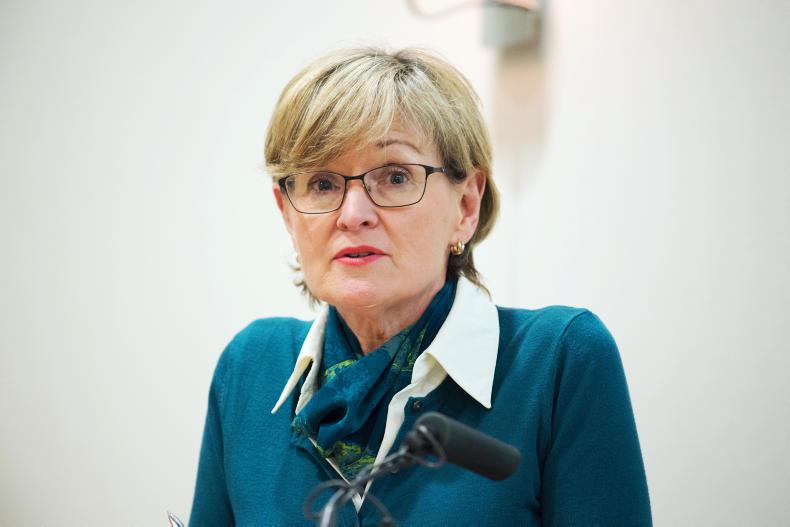Overly prescriptive schemes are time-limited and aren’t always effective in terms of changing management systems, according to Irish MEP and first vice-president of the European Parliament Mairead McGuinness.
Speaking about the Common Agricultural Policy (CAP) post-2020 at the Lismullin farming conference, she said: “If we want sustainable agriculture, taking into account the climate, environment, biodiversity and soils, then a five-year scheme won’t do that. “The approach [for CAP post-2020] is not about telling farmers what they can’t do but saying to farmers this is what we want you to achieve.
“It’s not about Europe setting every single detail of your farming activity, but about Europe setting the overall objectives of our agricultural policy and every member state deciding for themselves how to achieve those objectives and farmers then doing that.
“We want of course to link money to that delivery and we will of course still control how the money is spent but that will be more between Europe and the member state rather than directly between Europe and the farmer. I would hope it would result in less schemes where there’s five pages or 10 pages or more of things you have to do and tick off to get a certain amount of money.”
Instead she said she would be in favour of developing better management systems, by agricultural advisory services that would be linked in with practical farm knowledge on the ground.
On the issue of calendar farming, the Irish MEP said it was never about saying that on ‘X’ date you can go out and spread slurry.
“It was to try and set in place I suppose a rigid system that reflects the fact that we have to manage farm manure and slurry and use it as an input.
“So I would rather see no dates in the sense of rigidity around it; but that, as we have with blight spraying with the met service, you get a warning [when it’s not weather permitting to spread slurry].
“I’m not saying calendar farming will go in the sense of dates that are fixed at the moment, but I think it’s a different way of thinking about farming which gives control back to farmers once we set overall objectives.
“Competent authorities or departments of agriculture may not want that responsibility because, frankly, it’s nicer to blame Brussels when there’s a problem than to take the responsibility yourself.”
Read more
Putting a time on Irish beef access to China ‘not possible’
‘Public perception is farming’s number one threat’
Overly prescriptive schemes are time-limited and aren’t always effective in terms of changing management systems, according to Irish MEP and first vice-president of the European Parliament Mairead McGuinness.
Speaking about the Common Agricultural Policy (CAP) post-2020 at the Lismullin farming conference, she said: “If we want sustainable agriculture, taking into account the climate, environment, biodiversity and soils, then a five-year scheme won’t do that. “The approach [for CAP post-2020] is not about telling farmers what they can’t do but saying to farmers this is what we want you to achieve.
“It’s not about Europe setting every single detail of your farming activity, but about Europe setting the overall objectives of our agricultural policy and every member state deciding for themselves how to achieve those objectives and farmers then doing that.
“We want of course to link money to that delivery and we will of course still control how the money is spent but that will be more between Europe and the member state rather than directly between Europe and the farmer. I would hope it would result in less schemes where there’s five pages or 10 pages or more of things you have to do and tick off to get a certain amount of money.”
Instead she said she would be in favour of developing better management systems, by agricultural advisory services that would be linked in with practical farm knowledge on the ground.
On the issue of calendar farming, the Irish MEP said it was never about saying that on ‘X’ date you can go out and spread slurry.
“It was to try and set in place I suppose a rigid system that reflects the fact that we have to manage farm manure and slurry and use it as an input.
“So I would rather see no dates in the sense of rigidity around it; but that, as we have with blight spraying with the met service, you get a warning [when it’s not weather permitting to spread slurry].
“I’m not saying calendar farming will go in the sense of dates that are fixed at the moment, but I think it’s a different way of thinking about farming which gives control back to farmers once we set overall objectives.
“Competent authorities or departments of agriculture may not want that responsibility because, frankly, it’s nicer to blame Brussels when there’s a problem than to take the responsibility yourself.”
Read more
Putting a time on Irish beef access to China ‘not possible’
‘Public perception is farming’s number one threat’






 This is a subscriber-only article
This is a subscriber-only article










SHARING OPTIONS: